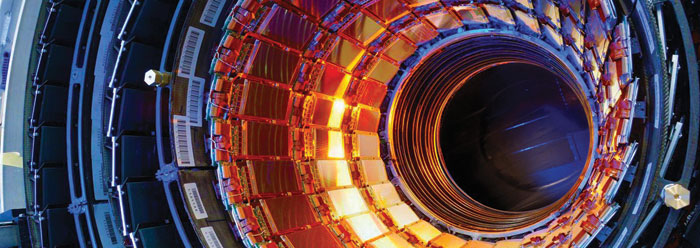 Higgs Boson Confirmed:
Separating Fact from Hype by Jake Hebert, Ph.D. *
Higgs Boson Confirmed:
Separating Fact from Hype by Jake Hebert, Ph.D. *
Scientists announced last week that they likely confirmed the existence of a particle called the Higgs boson.1 One media outlet said this of the Higgs boson: "It helps solve one of the most fundamental riddles of the universe: how the Big Bang created something out of nothing 13.7 billion years ago."2
But is this really true?
As noted in one of our online articles, there is a tendency for people to intuitively think of subatomic particles as being like wee-little marbles.3 However, a branch of physics called quantum field theory views particles as being "ripples" in quantities called fields. Many people may be familiar with the concept of a field from high school or college physics classes. The magnetic field surrounding a bar magnet is a well-known example: the fact that iron filings placed near the magnet align themselves along the magnetic field lines enables one to conceptually visualize the field surrounding the magnet. There is a field associated with the Higgs particle called the Higgs field. This field is somewhat different from more familiar examples of fields and is a particular kind called a scalar field.
The Standard Model is a theory that describes the relationships among elementary particles and three of the fundamental forces (it does not include gravity). Until this recent discovery, the existence of all the other particles in the Standard Model had been confirmed. Thus the confirmation of the Higgs' existence is a "big deal" in the physics community.
But why are some claiming that the Higgs boson helps to explain how the Big Bang supposedly created the universe? The reason involves something called inflation theory.
Early versions of the Big Bang model had serious problems. In order to address these particular problems, theorists invoked something called inflation—a hypothetical, short-lived "growth spurt" right after the supposed Big Bang during which the universe increased enormously in size. Originally, theorists thought that inflation ended very quickly after the Big Bang. However, they later concluded that inflation, once it began, would never completely stop. Rather, different regions of space would stop inflating at different times. This would generate infinitely many pocket or bubble universes, of which our universe is only one in a vast multiverse. In this newer view, inflation is the "spark" or "fuse" that caused the "blowing up" of our universe. Thus inflation, in a sense, is the cause of the Big Bang.4
How does this relate to the Higgs boson? Inflation theorists believe that inflation caused the Big Bang, and that inflation was caused by a scalar field. As noted earlier, the Higgs field is a scalar field. Hence, the discovery of the Higgs boson supposedly helps explain how the Big Bang allegedly created the universe.
However, there is a huge problem with this claim. Many—if not most—Big Bang theorists do not believe that the Higgs field caused the Big Bang! Rather, they believe that the Big Bang was caused by another (still hypothetical) scalar field whose existence has not been confirmed. That the Higgs field is not the field that caused the alleged Big Bang has been acknowledged even by staunch believers in the Big Bang, including theoretical physicist and Big Bang "evangelist" Lawrence Krauss and leading inflationary theorist Paul Steinhardt.5,6,7
In fairness, most physicists have not been making such exaggerated claims regarding the Higgs boson. In fact, some seem to be somewhat embarrassed by the particle's irreverent nickname "the God particle."8 However, because of some articles in the popular press, as well as some extremely confusing (if not outright misleading) statements by theoretical physicist and popular author Michio Kaku,9,10 many people are now under the mistaken impression that the Higgs boson caused the Big Bang, and that the Big Bang has been all but proven. Yes, secular physicists hope that a better understanding of the Higgs scalar field will help them understand how another (still unknown) scalar field "blew up" the universe, but this is a far cry from breathless suggestions that the discovery of the Higgs is the death-knell of Christianity!
Although the confirmation of the existence of the Higgs boson is a victory for the Standard Model, this in no way "proves" the Big Bang, which is still riddled with enormous theoretical difficulties.
References
- Landau, E. Scientists more certain that particle is Higgs boson. CNN. Posted online March 16, 2013.
- Heilprin, J. Higgs Boson Discovery Confirmed After Physicists Review Large Hadron Collider Data at CERN. The Huffington Post. Posted online March 14, 2013.
- Hebert, J. The Higgs Boson and the Big Bang. Acts & Facts. 41 (9): 11-13.
- Guth, A. Did the Universe Have a Beginning? Eternal Inflation: Introduction Cosmic Questions Smithsonian Institution Debate. Couterbalance. Accessed March 18, 2013.
- Steinhardt, P. The Inflation Debate. Scientific American. 304 (4): 36-43.
- Krauss, L. What is the Higgs boson and why does it matter? NewScientist. Posted online December 13, 2013.
- Falk, D. Canadian physicist Robert Orr on the Big Bang breakthrough. The Globe and Mail. Posted online July 6, 2012.
- Moskowitz, C. What should 'God Particle' Be Renamed? Physicists Weigh In. LiveScience. Posted online December 14, 2013.
- Kaku, M. The Spark That Caused the Big Bang. The Wall Street Journal. Posted online July 5, 2012.
- What is a Higgs Boson? – Physicist Michio Kaku responds. YouTube video, 2:47, CNN. Posted online July 4, 2012.
* Dr. Hebert is Research Associate at the Institute for Creation Research and received his Ph.D. in Physics from the University of Texas at Dallas.
Article posted on March 22, 2013.